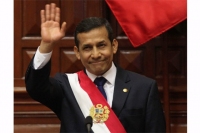 Ollanta Humala: keeping his wordA good deal of uncertainty surrounded the election of Ollanta Humala, as well as his swearing in as president on July 28. The first two months of the new government have given the sensation that it knows where it is going and how to get there. Even some of Humala’s critics have been forced to acknowledge that there is movement, and that campaign promises are being followed through.
Ollanta Humala: keeping his wordA good deal of uncertainty surrounded the election of Ollanta Humala, as well as his swearing in as president on July 28. The first two months of the new government have given the sensation that it knows where it is going and how to get there. Even some of Humala’s critics have been forced to acknowledge that there is movement, and that campaign promises are being followed through.
Both during the election campaign and thereafter, Humala was at pains to distance himself from the sort of rhetoric that had permeated his (ultimately unsuccessful) 2006 bid for the presidency. In economic policy, Peru under Humala would not err far from the pro-market straight and narrow which had encouraged foreign investment. In social policy, the new government would embark on new and aggressive policies to reduce poverty and to encourage social inclusion. The emblematic figure here is that of Lula in Brazil, not Chávez in Venezuela.
Combining these two approaches may not be easy. But, so far at least – and it is still very early days – it seems to be working. The markets seem to have accepted Humala’s legitimacy, and the government has announced a number of interesting initiatives which enjoy widespread acceptance. Many of these moves were contained in Humala’s election manifesto. They include:
– The windfall tax on extraordinary mining profits. Following negotiations with mining companies and their lobby organisation (SNMPE), the government announced on August 25 that it would raise annually the equivalent of £675m (US$ 1.1bn) in extra revenue from the tax on operating profits of all mining companies. The actual rate of tax – which was significantly lower than many of the firms had originally feared – will be fixed on a sliding scale depending on variations in world minerals prices. The money raised is to be spent on social programmes to tackle poverty. Humala’s predecessor, Alan García, refused to introduce a compulsory windfall tax.
The new law on informed prior consent. This was unanimously passed by Congress on 23 August. The law makes mandatory full consultation with indigenous and peasant communities where concessions to extractive industries are granted on their lands or where infrastructure projects are planned. This brings Peru into compliance with International Labour Organisation Convention 169. Even though this had been ratified by Peru, it had effectively been ignored by previous governments. Where agreement is not reached, the state will ultimately have the last word (though is required to take “all necessary measures” to ensure indigenous rights are respected).
A new approach to drugs control. With Ricardo Soberón in charge of Devida (the main drugs control agency) the emphasis is to shift away from coca eradication towards a more effective clampdown on cocaine manufacture, drug-trafficking, money laundering and the flow of precursor chemicals. Soberón’s appointment proved controversial, since he has long been a critic of coca eradication policies. But the new approach appears to have the tacit support of the US State Department. The old approach to coca eradication was plainly not working since acreages have increased every year since 2005.
A new universal pensions system. The so-called Pensión-65 will be an entitlement to all over the age of 65. It is to come into force gradually over the next year or two and will be initiated on a pilot basis in the regions of Puno and Ica this October. Other social programmes have also been announced, like Cuna Más (for infants) and Beca 18 (for school leavers). The conditional cash-transfer programme, Juntos, is also to be expanded.
The creation of a new ministry for social inclusion. In coordination with regional and other sub-national tiers of government, the new ministry will take over responsibility for a range of social promotion policies. It will be called the Ministry of Development and Social Inclusion.
Of course, one thing is to announce a programme or even pass a law; another is to make it happen. Much therefore will depend on the Humala government’s capacity to translate words into deeds. And also there are bigger promises to fulfil, like defeating corruption and providing citizens with greater security. But it’s not a bad start.
Peru Support Group. Click here to enter website.

